PHIL 1100 Ethics Assignment: Just War Theory, Moral Rules, and War
VerifiedAdded on 2022/11/28
|5
|1264
|457
Homework Assignment
AI Summary
This assignment delves into the complexities of Just War Theory, exploring the perspectives of various philosophers and political figures. It begins by defining absolute moral rules and examining Elizabeth Anscombe's argument against war, followed by an analysis of Immanuel Kant's views on moral rules and the justification of killing. The assignment then examines former President Jimmy Carter's criteria for a just war, contrasting them with the 2003 invasion of Iraq. The student's analysis includes the views of Anscombe, Kant, and Carter on the ethics of war, and the student also provides their own viewpoint on whether the Iraq War met Carter's conditions for a just war. The solution incorporates references to the required readings, including chapters from the Rachels text and an op-ed by Jimmy Carter, as well as supplementary information from the Stanford Encyclopedia of Philosophy.
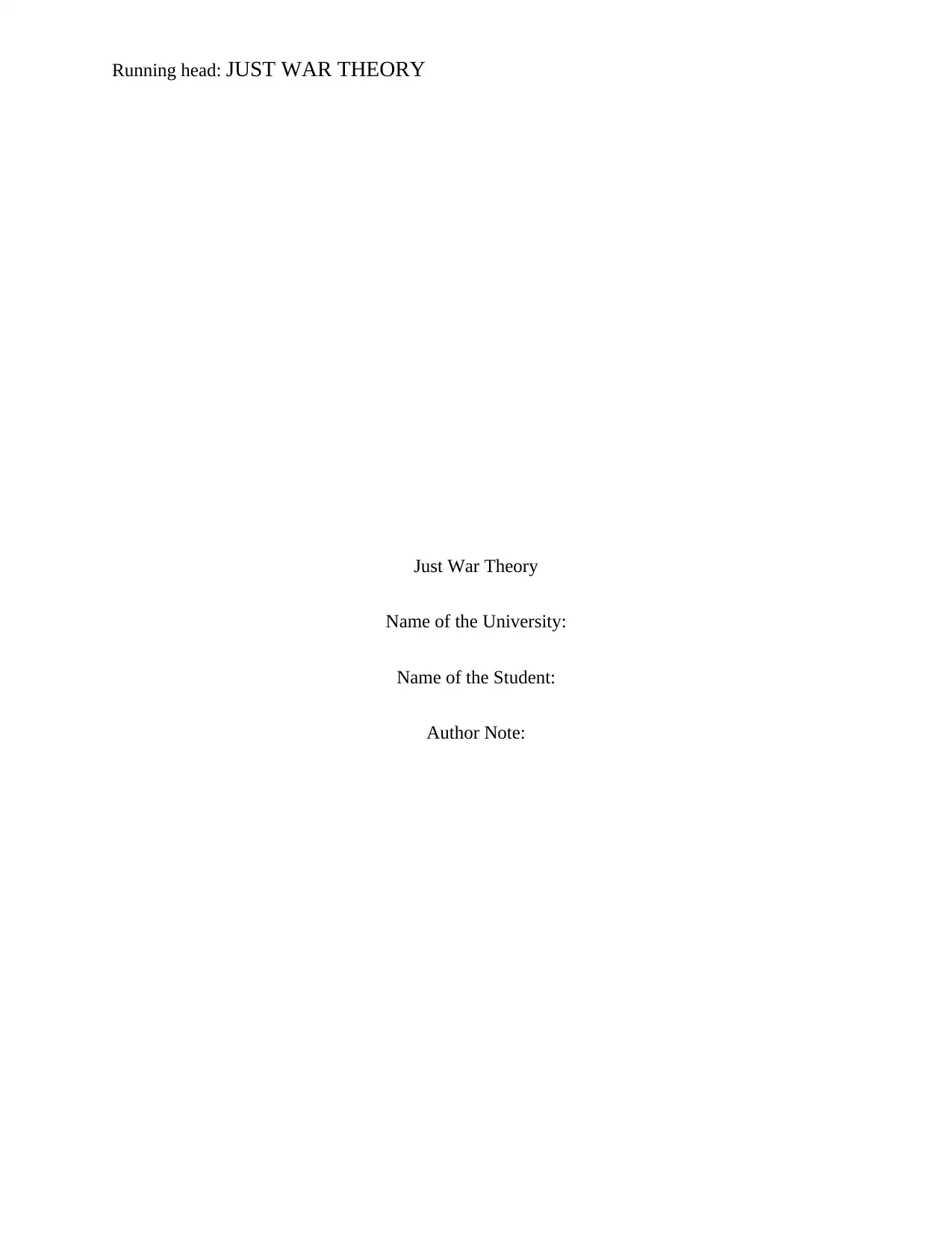
Running head: JUST WAR THEORY
Just War Theory
Name of the University:
Name of the Student:
Author Note:
Just War Theory
Name of the University:
Name of the Student:
Author Note:
Paraphrase This Document
Need a fresh take? Get an instant paraphrase of this document with our AI Paraphraser
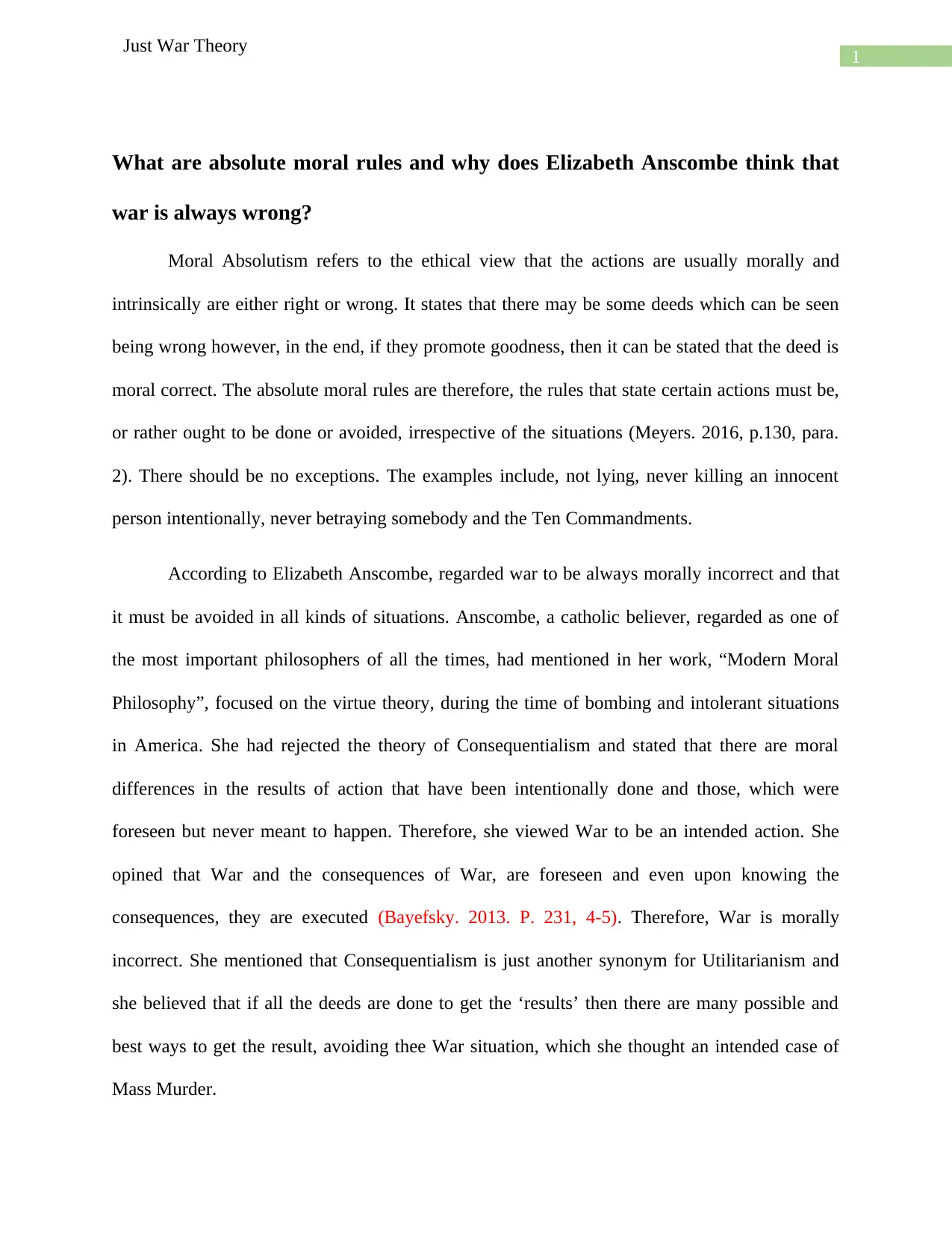
1
Just War Theory
What are absolute moral rules and why does Elizabeth Anscombe think that
war is always wrong?
Moral Absolutism refers to the ethical view that the actions are usually morally and
intrinsically are either right or wrong. It states that there may be some deeds which can be seen
being wrong however, in the end, if they promote goodness, then it can be stated that the deed is
moral correct. The absolute moral rules are therefore, the rules that state certain actions must be,
or rather ought to be done or avoided, irrespective of the situations (Meyers. 2016, p.130, para.
2). There should be no exceptions. The examples include, not lying, never killing an innocent
person intentionally, never betraying somebody and the Ten Commandments.
According to Elizabeth Anscombe, regarded war to be always morally incorrect and that
it must be avoided in all kinds of situations. Anscombe, a catholic believer, regarded as one of
the most important philosophers of all the times, had mentioned in her work, “Modern Moral
Philosophy”, focused on the virtue theory, during the time of bombing and intolerant situations
in America. She had rejected the theory of Consequentialism and stated that there are moral
differences in the results of action that have been intentionally done and those, which were
foreseen but never meant to happen. Therefore, she viewed War to be an intended action. She
opined that War and the consequences of War, are foreseen and even upon knowing the
consequences, they are executed (Bayefsky. 2013. P. 231, 4-5). Therefore, War is morally
incorrect. She mentioned that Consequentialism is just another synonym for Utilitarianism and
she believed that if all the deeds are done to get the ‘results’ then there are many possible and
best ways to get the result, avoiding thee War situation, which she thought an intended case of
Mass Murder.
Just War Theory
What are absolute moral rules and why does Elizabeth Anscombe think that
war is always wrong?
Moral Absolutism refers to the ethical view that the actions are usually morally and
intrinsically are either right or wrong. It states that there may be some deeds which can be seen
being wrong however, in the end, if they promote goodness, then it can be stated that the deed is
moral correct. The absolute moral rules are therefore, the rules that state certain actions must be,
or rather ought to be done or avoided, irrespective of the situations (Meyers. 2016, p.130, para.
2). There should be no exceptions. The examples include, not lying, never killing an innocent
person intentionally, never betraying somebody and the Ten Commandments.
According to Elizabeth Anscombe, regarded war to be always morally incorrect and that
it must be avoided in all kinds of situations. Anscombe, a catholic believer, regarded as one of
the most important philosophers of all the times, had mentioned in her work, “Modern Moral
Philosophy”, focused on the virtue theory, during the time of bombing and intolerant situations
in America. She had rejected the theory of Consequentialism and stated that there are moral
differences in the results of action that have been intentionally done and those, which were
foreseen but never meant to happen. Therefore, she viewed War to be an intended action. She
opined that War and the consequences of War, are foreseen and even upon knowing the
consequences, they are executed (Bayefsky. 2013. P. 231, 4-5). Therefore, War is morally
incorrect. She mentioned that Consequentialism is just another synonym for Utilitarianism and
she believed that if all the deeds are done to get the ‘results’ then there are many possible and
best ways to get the result, avoiding thee War situation, which she thought an intended case of
Mass Murder.
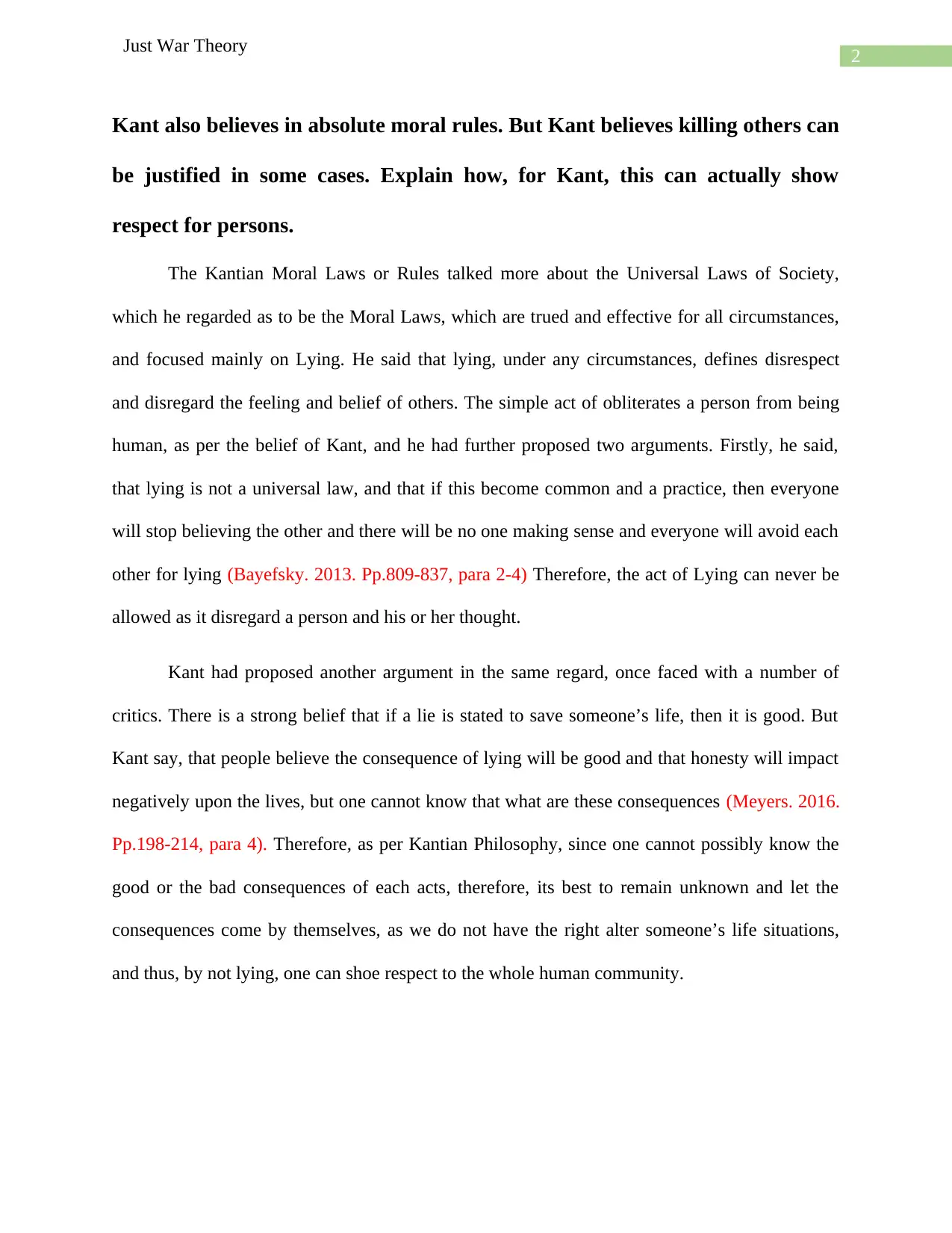
2
Just War Theory
Kant also believes in absolute moral rules. But Kant believes killing others can
be justified in some cases. Explain how, for Kant, this can actually show
respect for persons.
The Kantian Moral Laws or Rules talked more about the Universal Laws of Society,
which he regarded as to be the Moral Laws, which are trued and effective for all circumstances,
and focused mainly on Lying. He said that lying, under any circumstances, defines disrespect
and disregard the feeling and belief of others. The simple act of obliterates a person from being
human, as per the belief of Kant, and he had further proposed two arguments. Firstly, he said,
that lying is not a universal law, and that if this become common and a practice, then everyone
will stop believing the other and there will be no one making sense and everyone will avoid each
other for lying (Bayefsky. 2013. Pp.809-837, para 2-4) Therefore, the act of Lying can never be
allowed as it disregard a person and his or her thought.
Kant had proposed another argument in the same regard, once faced with a number of
critics. There is a strong belief that if a lie is stated to save someone’s life, then it is good. But
Kant say, that people believe the consequence of lying will be good and that honesty will impact
negatively upon the lives, but one cannot know that what are these consequences (Meyers. 2016.
Pp.198-214, para 4). Therefore, as per Kantian Philosophy, since one cannot possibly know the
good or the bad consequences of each acts, therefore, its best to remain unknown and let the
consequences come by themselves, as we do not have the right alter someone’s life situations,
and thus, by not lying, one can shoe respect to the whole human community.
Just War Theory
Kant also believes in absolute moral rules. But Kant believes killing others can
be justified in some cases. Explain how, for Kant, this can actually show
respect for persons.
The Kantian Moral Laws or Rules talked more about the Universal Laws of Society,
which he regarded as to be the Moral Laws, which are trued and effective for all circumstances,
and focused mainly on Lying. He said that lying, under any circumstances, defines disrespect
and disregard the feeling and belief of others. The simple act of obliterates a person from being
human, as per the belief of Kant, and he had further proposed two arguments. Firstly, he said,
that lying is not a universal law, and that if this become common and a practice, then everyone
will stop believing the other and there will be no one making sense and everyone will avoid each
other for lying (Bayefsky. 2013. Pp.809-837, para 2-4) Therefore, the act of Lying can never be
allowed as it disregard a person and his or her thought.
Kant had proposed another argument in the same regard, once faced with a number of
critics. There is a strong belief that if a lie is stated to save someone’s life, then it is good. But
Kant say, that people believe the consequence of lying will be good and that honesty will impact
negatively upon the lives, but one cannot know that what are these consequences (Meyers. 2016.
Pp.198-214, para 4). Therefore, as per Kantian Philosophy, since one cannot possibly know the
good or the bad consequences of each acts, therefore, its best to remain unknown and let the
consequences come by themselves, as we do not have the right alter someone’s life situations,
and thus, by not lying, one can shoe respect to the whole human community.
⊘ This is a preview!⊘
Do you want full access?
Subscribe today to unlock all pages.

Trusted by 1+ million students worldwide
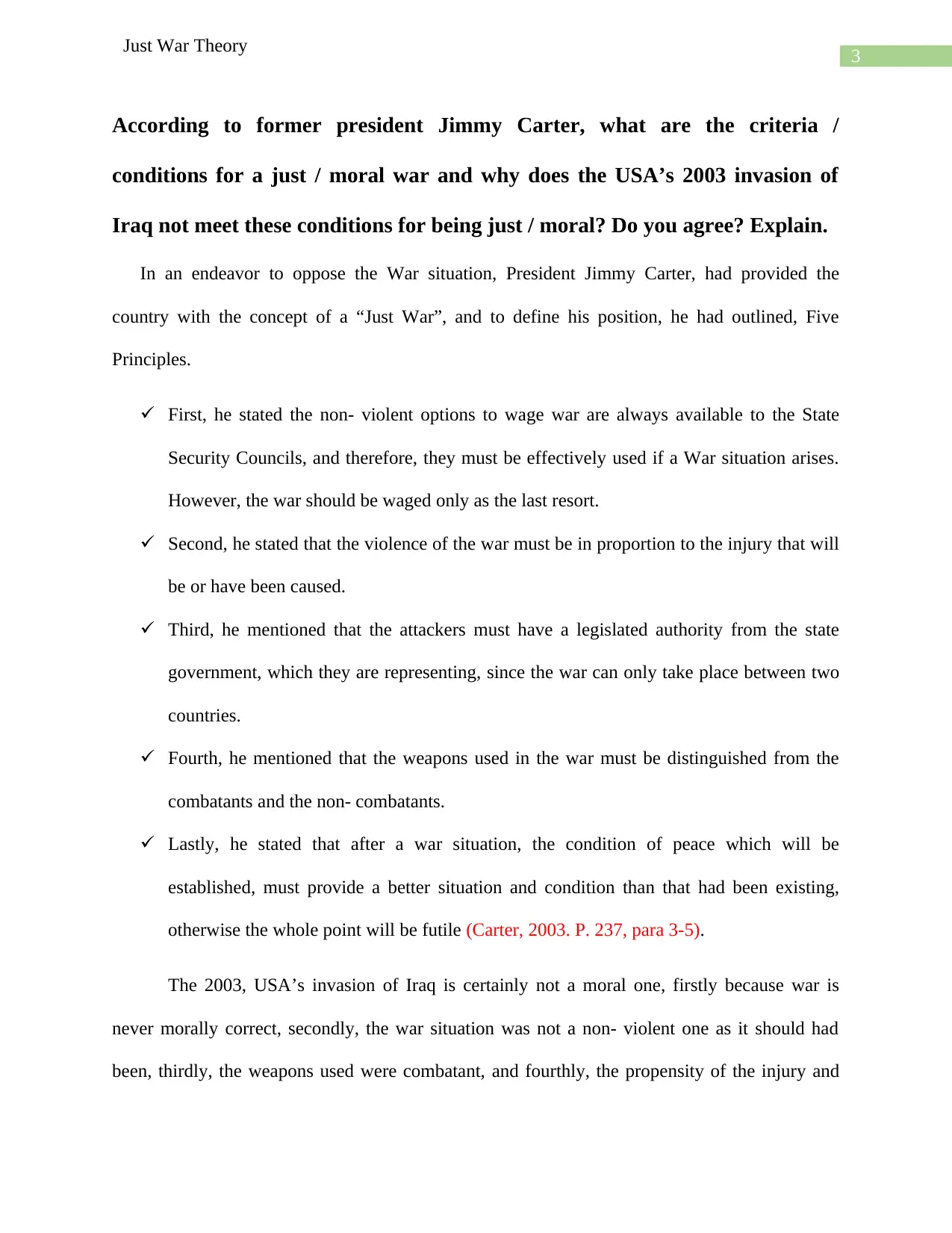
3
Just War Theory
According to former president Jimmy Carter, what are the criteria /
conditions for a just / moral war and why does the USA’s 2003 invasion of
Iraq not meet these conditions for being just / moral? Do you agree? Explain.
In an endeavor to oppose the War situation, President Jimmy Carter, had provided the
country with the concept of a “Just War”, and to define his position, he had outlined, Five
Principles.
First, he stated the non- violent options to wage war are always available to the State
Security Councils, and therefore, they must be effectively used if a War situation arises.
However, the war should be waged only as the last resort.
Second, he stated that the violence of the war must be in proportion to the injury that will
be or have been caused.
Third, he mentioned that the attackers must have a legislated authority from the state
government, which they are representing, since the war can only take place between two
countries.
Fourth, he mentioned that the weapons used in the war must be distinguished from the
combatants and the non- combatants.
Lastly, he stated that after a war situation, the condition of peace which will be
established, must provide a better situation and condition than that had been existing,
otherwise the whole point will be futile (Carter, 2003. P. 237, para 3-5).
The 2003, USA’s invasion of Iraq is certainly not a moral one, firstly because war is
never morally correct, secondly, the war situation was not a non- violent one as it should had
been, thirdly, the weapons used were combatant, and fourthly, the propensity of the injury and
Just War Theory
According to former president Jimmy Carter, what are the criteria /
conditions for a just / moral war and why does the USA’s 2003 invasion of
Iraq not meet these conditions for being just / moral? Do you agree? Explain.
In an endeavor to oppose the War situation, President Jimmy Carter, had provided the
country with the concept of a “Just War”, and to define his position, he had outlined, Five
Principles.
First, he stated the non- violent options to wage war are always available to the State
Security Councils, and therefore, they must be effectively used if a War situation arises.
However, the war should be waged only as the last resort.
Second, he stated that the violence of the war must be in proportion to the injury that will
be or have been caused.
Third, he mentioned that the attackers must have a legislated authority from the state
government, which they are representing, since the war can only take place between two
countries.
Fourth, he mentioned that the weapons used in the war must be distinguished from the
combatants and the non- combatants.
Lastly, he stated that after a war situation, the condition of peace which will be
established, must provide a better situation and condition than that had been existing,
otherwise the whole point will be futile (Carter, 2003. P. 237, para 3-5).
The 2003, USA’s invasion of Iraq is certainly not a moral one, firstly because war is
never morally correct, secondly, the war situation was not a non- violent one as it should had
been, thirdly, the weapons used were combatant, and fourthly, the propensity of the injury and
Paraphrase This Document
Need a fresh take? Get an instant paraphrase of this document with our AI Paraphraser
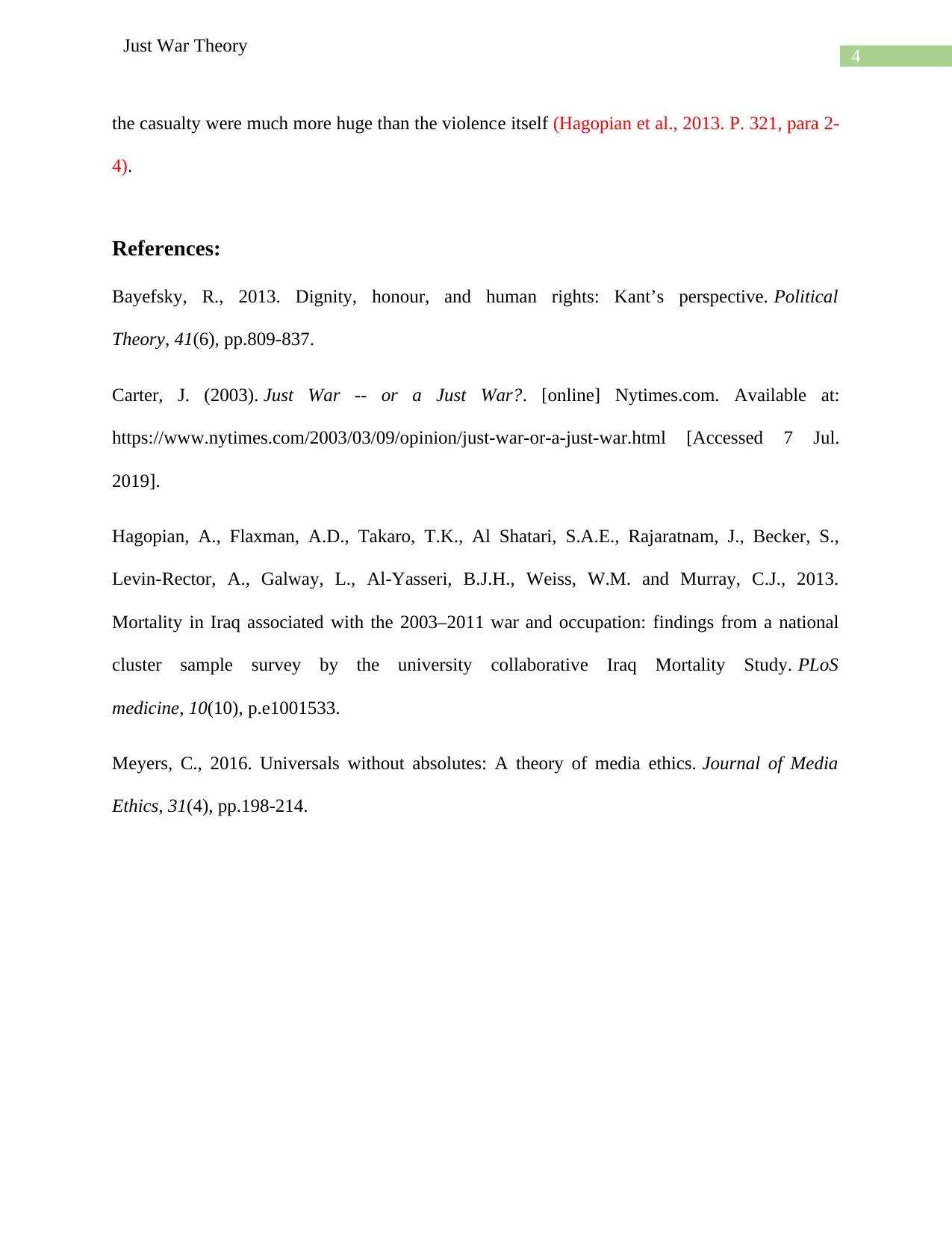
4
Just War Theory
the casualty were much more huge than the violence itself (Hagopian et al., 2013. P. 321, para 2-
4).
References:
Bayefsky, R., 2013. Dignity, honour, and human rights: Kant’s perspective. Political
Theory, 41(6), pp.809-837.
Carter, J. (2003). Just War -- or a Just War?. [online] Nytimes.com. Available at:
https://www.nytimes.com/2003/03/09/opinion/just-war-or-a-just-war.html [Accessed 7 Jul.
2019].
Hagopian, A., Flaxman, A.D., Takaro, T.K., Al Shatari, S.A.E., Rajaratnam, J., Becker, S.,
Levin-Rector, A., Galway, L., Al-Yasseri, B.J.H., Weiss, W.M. and Murray, C.J., 2013.
Mortality in Iraq associated with the 2003–2011 war and occupation: findings from a national
cluster sample survey by the university collaborative Iraq Mortality Study. PLoS
medicine, 10(10), p.e1001533.
Meyers, C., 2016. Universals without absolutes: A theory of media ethics. Journal of Media
Ethics, 31(4), pp.198-214.
Just War Theory
the casualty were much more huge than the violence itself (Hagopian et al., 2013. P. 321, para 2-
4).
References:
Bayefsky, R., 2013. Dignity, honour, and human rights: Kant’s perspective. Political
Theory, 41(6), pp.809-837.
Carter, J. (2003). Just War -- or a Just War?. [online] Nytimes.com. Available at:
https://www.nytimes.com/2003/03/09/opinion/just-war-or-a-just-war.html [Accessed 7 Jul.
2019].
Hagopian, A., Flaxman, A.D., Takaro, T.K., Al Shatari, S.A.E., Rajaratnam, J., Becker, S.,
Levin-Rector, A., Galway, L., Al-Yasseri, B.J.H., Weiss, W.M. and Murray, C.J., 2013.
Mortality in Iraq associated with the 2003–2011 war and occupation: findings from a national
cluster sample survey by the university collaborative Iraq Mortality Study. PLoS
medicine, 10(10), p.e1001533.
Meyers, C., 2016. Universals without absolutes: A theory of media ethics. Journal of Media
Ethics, 31(4), pp.198-214.
1 out of 5
Your All-in-One AI-Powered Toolkit for Academic Success.
+13062052269
info@desklib.com
Available 24*7 on WhatsApp / Email
![[object Object]](/_next/static/media/star-bottom.7253800d.svg)
Unlock your academic potential
Copyright © 2020–2026 A2Z Services. All Rights Reserved. Developed and managed by ZUCOL.